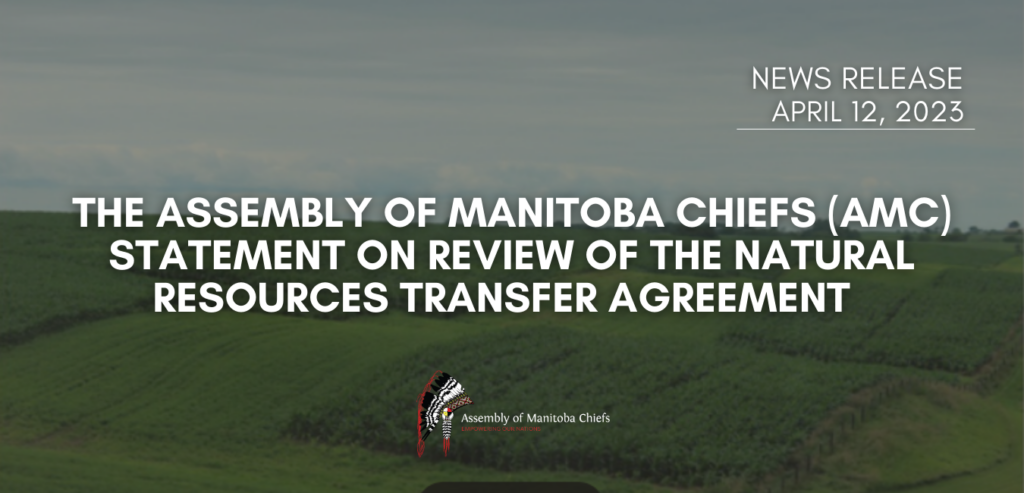The Assembly of Manitoba Chiefs (AMC) Statement on Review of the Natural Resources Transfer Agreement

April 12, 2023
Treaty One Territory, Manitoba
AMC Communications
Treaty One Territory, Manitoba – The Assembly of Manitoba Chiefs (AMC) addressed the Federal Justice Minister’s comments with respect to reviewing the 1930 Natural Resources Transfer Agreement (NRTA) with the prairie provinces.
“I want to acknowledge federal Minister Lametti’s comments that he is open to reviewing the many issues surrounding the Natural Resources Transfer Agreements with the prairie provinces. Despite First Nations laws and customs, lands and natural resources were illegally transferred to provinces. When First Nations entered into nation-to-nation agreements with the Crown, they did so as sovereign Nations. The First Nations and the newcomers reached a land and resource-sharing agreement. For the past 93 years, First Nations have asserted that the Federal Government ignored the perspectives of First Nations that they had not relinquished their natural resource rights when Treaties were signed and that the Federal Government had no authority to transfer these rights to provinces,” said Grand Chief Cathy Merrick.
During times of economic crisis, NRTAs were implemented to increase provincial revenue. The NRTAs sought to transfer the Crown’s interest in all Crown lands, mines, minerals, and royalties within the province to the province, along with all sums due or payable for such lands, mines, minerals, and royalties. So, under the NRTAs, Manitoba also gained fishery rights, subject to Parliament’s right to exercise legislative authority over coastal and inland fisheries under the Constitution Act 1867. Also, when Canada transferred natural resources to the provinces, it ensured that First Nations rights, particularly hunting rights, would be protected. However, these NRTAs unilaterally altered the Treaty rights of First Nations people to hunt and fish to preserve their future land-based livelihoods.
Canada amended the Indian Act of 1927 during the negotiation of these natural resource transfer agreements to include section 141, which states that “any individual who receives, obtains, or requests money from an Indian to hire legal counsel to protect their lands and resources is guilty of an offence.” Thereby leaving First Nations with no legal recourse to transfer these natural resources. Since that time, First Nations lakes have been depleted, and provincial and federal governments have restricted hunting, trapping, and selling goods, making it impossible for a commercial livelihood from traditional activities. As a result of this illegal use of First Nations lands and resources for hydro development, logging, and mining over the past nine decades, the prairie provinces have received an unimaginable amount of money.
“Recently, the Pope spoke out against those concepts that fail to recognize the inherent rights of First Nations, and as such, it is impossible to erase our history,” said Grand Chief Cathy Merrick. “First Nations must be included in all discussions relating to rescinding or amending the NRTAs for the federal government to learn from its original mistakes and unlawful behaviour.”
AMC member First Nations look forward to having a comprehensive conversation with our Treaty partner – the Government of Canada in right of the Crown – about First Nations’ rights to self-determination, including over lands and resources, as well as how First Nations never abandoned these rights when negotiating Treaties over 150 years ago.
For more information, please contact:
Communications Team
Assembly of Manitoba Chiefs
Email: media@manitobachiefs.com
About the Assembly of Manitoba Chiefs
The AMC was formed in 1988 by the Chiefs in Manitoba to advocate on issues that commonly affect First Nations in Manitoba. AMC is an authorized representative of 62 of the 63 First Nations in Manitoba with a total of more than 151,000 First Nation citizens in the province, accounting for approximately 12 percent of the provincial population. AMC represents a diversity of Anishinaabe (Ojibway), Nehetho / Ininew (Cree), Anishininew (Ojibwe-Cree), Denesuline (Dene) and Dakota Oyate (Dakota) people.